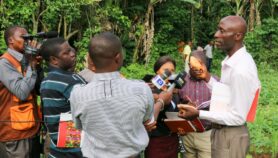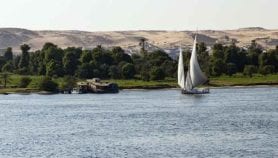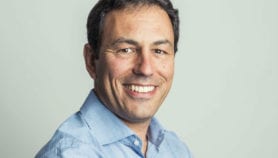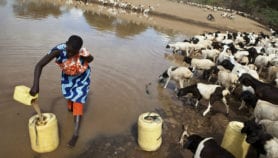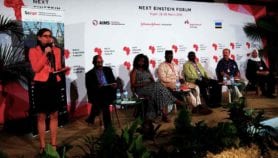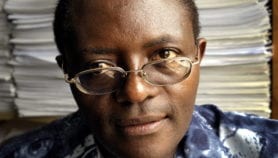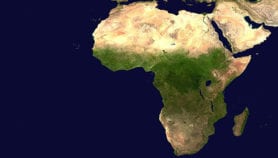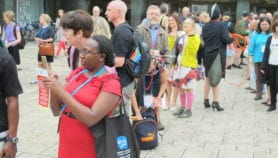Send to a friend
The details you provide on this page will not be used to send unsolicited email, and will not be sold to a 3rd party. See privacy policy.
Christina Scott, Diran Onifade and Julie Clayton say journalistic mentoring is key to getting African science the attention it deserves.
Is any science going on in developing countries? Take Africa. Considering the level of research activity on the continent — in biomedicine, climate change and the environment, for instance — the answer should be yes. But with a few exceptions, the world rarely hears of research from and for Africa.
There are many reasons for this silence.
Africa occupies a very specific niche in the international media. African issues seldom merit attention unless they fall under the category of ‘disasters’: war, famine, flood and epidemics. We might hear of AIDS, malaria and tuberculosis, but not how African scientists are responding to these challenges.
From the outside, there is a lack of media attention. On the inside, exacerbating this problem, there is a distinct lack of capacity among African journalists — an inability to cover complicated scientific developments in a way that speaks to the needs of locals. Meanwhile African scientists are often so burdened by enormous teaching loads and poor communications infrastructure that sending out a press release is an impossible luxury.
Journalists eager to cover science struggle with other problems: media proprietors and managers can fear or resent scientists and do not prioritise science stories. If on occasion a science story makes it through the various roadblocks, journalists often lack the understanding to communicate the relevance of the story.
It is true that some newspapers, magazines and broadcasters have special sections for environmental and health coverage. Hard-pressed, cash-strapped editors have been known to argue that this is sufficient. Meanwhile, other media simply import inexpensive stories from abroad to fill a space and make it appear as if there is a diverse mix of stories.
The result is that in some cases, science from Africa, by Africans, returns to Africa with the emphasis on Western researchers. In the most distressing cases, all references to African scientists are absent.
This unfortunate situation means that many scientific developments go unreported. The resulting gap is frequently exploited by media-savvy quacks and dissident scientists — such as those in South Africa who argue against the use of drugs to treat HIV/AIDS. In some cases, it is easier for a charlatan peddling a fake cure for AIDS to get column inches than it is for a reputable scientist working on AIDS vaccines, virology or microbicides.
Enter the mentors
But there are pioneers out there battling the incredible odds — a handful of veteran journalists in countries such as Cameroon, Kenya and Senegal. Although they have been instrumental in keeping the profession alive, trying to encourage others to follow in their footsteps, their isolation has been extreme. Fortunately, a new initiative is now underway to equip the media in developing countries with skills and strategies for consistent, accurate, enjoyable reporting on science.
The new scheme, known as the Peer-to-Peer Mentoring Programme, is the brainchild of the World Federation of Science Journalists (WFSJ). There is already a shortlist of journalists in print, broadcasting and the Internet eager to enrol for the two years of mentoring offered under the programme (see Science reporters in developing nations get mentors).
Participating journalists will continue to work for their respective media outlets in their usual languages, while at the same time receiving encouragement and professional advice from experienced science journalists in both developed and developing countries.
The scheme has attracted more than 20 mentors from Africa, Europe and North America. The authors of this article are all involved with the Anglophone Africa group, which has so far drawn applications from journalists in 14 countries. The group for Francophone Africa is led by science journalism professor Gervais Mbarga of the University of Yaoundé in Cameroon, while the North Africa and Middle East group is chaired by Nadia el-Awady of the bilingual Islam Online website in Egypt.
How will it work? Each mentor will coach four practising journalists, not as another layer of editorial control but as equals. Some of the participants may be fairly advanced reporters battling to maintain motivation and focus. Others will be young reporters uncomfortable with telling a respected scientist that his or her explanation is incomprehensible. Their needs will dictate much of the mentoring.
Living laboratory
There have been other outreach programmes focusing on science journalism in Africa, but many have been workshops lasting a few days. What sets this project apart is that it sustains the mentoring on a regular basis over two years. Unlike formal education, there is no disruption to the newsroom, which many editors fear. And most importantly, it works by exchange of ideas and information via a dedicated website, phone calls, emails and face-to-face meetings.
The WFSJ hosts the website, which allows participants to post examples of print, radio and television reports online for assessment. And the programme will be a living laboratory, providing participants with opportunities to cover important scientific conferences and meet with each other.
The long-term nature of the programme will allow an ongoing evaluation of its impact, making it one of the first of its kind. The lessons learned from the first two years of operation in Africa, North Africa and the Middle East could be used to expand the programme to cover Latin America, Asia and Eastern Europe.
And, as is appropriate for a journalistic programme, deadlines loom. The first batch of journalists from Africa and the Middle East need to submit three examples of their work, and personal details, by the end of the month. Mentoring begins in September.
Time is running out, in more ways that one.
Christina Scott, Diran Onifade and Julie Clayton are all mentors for the WFSJ Peer-to-Peer Mentoring Programme.
To apply to participate in the programme please contact: Jean-Marc Fleury, executive director, World Federation of Science Journalists. Email: [email protected].



